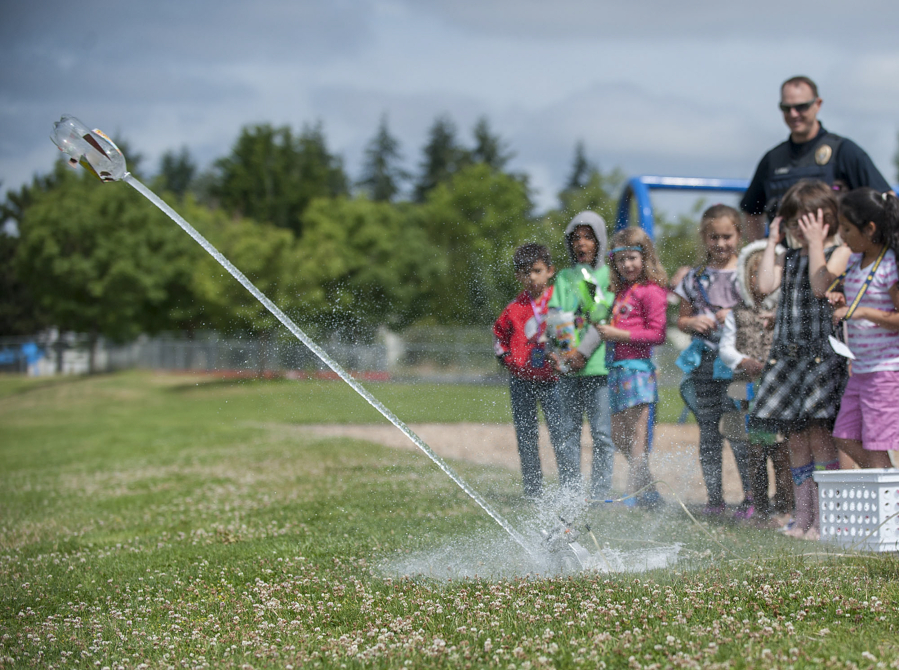All systems were “go” as junior rocket builders crowded around the launch pad on the playground at Orchards Elementary School on Friday morning.
“Five, four, three, two, one!” Ephraim Camp, 10, counted down. Then he shouted: “Blast off!”
Pushing the lever, he released his 2-liter bottle rocket, which shot into the air. All around him, the other kids oohed and aahed. Some squealed.
It was Mad Science week at the Police Activities League summer camp, a free nine-week day camp for students in first through sixth grade at Orchards Elementary. Campers had made volcanoes, crystals and more during the week.
But Friday’s experiment, building and shooting bottle rockets, “is the highlight of the whole week,” said Jenny Thompson, executive director of PAL and camp director.
Coming in August:
CSI: Vancouver
Police Activities League forensics camp for teens
• What: Learn about being a crime scene investigator.
• Who: Ages 12 to 18.
• When: 9 a.m. to noon Aug. 1 through 5.
• Where: Vancouver Police Department West Precinct, 2800 N.E. Stapleton Road.
• Cost: $250 per camper; some scholarships are available.
• To register: Contact Jenny Thompson, 360-487-7487.
• On the Web: Learn more at www.vancouverpal.org
Leading the rocketry experiment was Keith Stansbury, an aerospace engineer who heads the Computer Assisted Drafting and Design technologies department at Clark College. He also advises Clark’s Aerospace Club. He and his students had recently returned from launching their fiberglass rocket in an international collegiate competition in Utah.
Even though the elementary students used 2-liter pop bottles, this also was rocket science.
Stansbury ran through the physics of the simple bottle rockets: “An air compressor pushes compressed air. The high pressure is the energy. The water provides the mass. The high pressure forces the water out so there’s an equal and opposite reaction.”
Then he explained it in layman’s terms: The rocket propels forward as the water is pushed out the back.
Diana Roemhildt, 6, had already launched her rocket twice. Stansbury offered to tweak her rocket to get better results.
“Let’s make your rocket go higher,” said Stansbury. “We’re going to add a bunch of weight to the nose to show how it can actually fly.”
First, he duct-taped a bundle of rocks onto the nose. Then he cut more fins from a thick sheet of cardboard and duct-taped them to Diana’s rocket, which she had named The Big and Beyond.
“Mine’s going to be extra high!” she exclaimed as she watched Stansbury make improvements to her rocket.
Handing the launch craft back to the young rocket builder, Stansbury said: “This is going to fly nicely.”
Diana crouched on the playground and placed The Big and Beyond on the launch pad. With added weight and extra fins, her rocket was ready.
So was Diana. She counted down to “blast off” and pushed the lever.
The rocket dumped its water payload and propelled high into the air — higher than it had gone before. Diana watched her rocket shoot over the grassy field, begin its descent and drop onto the grass. Smiling, the rocket girl ran to retrieve it.
“Nice! That was excellent!” Stansbury said. “Part of the cool thing for the kids is to empower them to launch their own rocket.”
The last rocket had been launched. Across the playground kids had gathered for the next Mad Science camp activity: making ice cream, which Thompson described as “a chemical reaction.”
“We’re making ice cream! And it’s cold!” said a girl as she kneaded a zippered plastic bag filled with ice cream mixture.
Last summer, the day camp was offered only at Orchards Elementary. The daily head count ranged between 15 and 20 kids. This summer, a second camp was added at Mill Plain Elementary. The total daily head count this year is about 60 kids.
“Sometimes it seems a bit chaotic,” said Thompson. “But they’re having fun and they’re safe. And they’re learning.”
Lt. Steve Neal was one of the Vancouver Police Department officers and Clark County Sheriff’s deputies who have volunteered at the summer camp geared for low-income kids. About half a dozen law enforcement officers stopped by Friday to help kids build rockets.
“I love the aspect of kids seeing police officers in a typical setting to show that the police are here to help. We’re just people. We like to get a couple of officers each day just to stroll through and say ‘hi.’ If they can stay longer and help the kids with projects, even better. That’s what PAL is all about — building those relationships.”
The camps are paid for by an $8,500 Vancouver Energy community grant and a $2,700 Nautilus grant. The grant also helps cover an upcoming Vancouver: CSI forensics camp for teens in August. The Portland Police Bureau’s Sunshine Division and Whole Foods in Vancouver are providing snacks.
Although the elementary school camps are full, Thompson said there’s still space in the forensics camp for teens in August.




